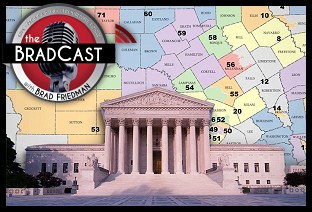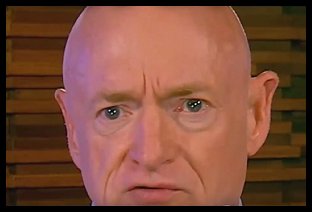 Despite being found a violation of the federal Voting Rights Act by multiple federal courts reviewing several challenges to Wisconsin's Republican-enacted Photo ID voting restriction, the law will stay in place this November, as per a new federal court ruling issued Friday. The court's reasoning is based on an assurance by the state that free Photo IDs will be made more readily available and easier to obtain than they have been in the past.
Despite being found a violation of the federal Voting Rights Act by multiple federal courts reviewing several challenges to Wisconsin's Republican-enacted Photo ID voting restriction, the law will stay in place this November, as per a new federal court ruling issued Friday. The court's reasoning is based on an assurance by the state that free Photo IDs will be made more readily available and easier to obtain than they have been in the past.
Late last week, by way of a unanimous decision [PDF], the full U.S. Seventh Circuit Court of Appeal denied competing appeals and cross appeals filed in the two cases challenging Wisconsin's restrictive voting law.
Earlier this month, the plaintiffs in these two cases, Frank v. Walker and One Wisconsin Institute v.Thompsen, sought emergency relief from the full 7th Circuit because it appeared, based on a decision by a conservative three-judge 7th Circuit panel, that nearly ten percent of Wisconsin's electorate was at risk of disenfranchisement via the Republican-enacted statute.
However, as the full court noted in its Friday decision, subsequent to the filing of those emergency petitions, the state of Wisconsin assured the court that it "has enacted a rule that requires the Division of Motor Vehicles ('DMV') to mail automatically a free photo ID to anyone who comes to DMV one time and initiates the free ID process." The court added:
The ruling did not sit well with ACLU senior staff attorney Sean Young, who, pointing to Wisconsin's failed record over the past five years to "get IDs into the hands of voters who need them," said "there's no reason to believe that the state's latest eleventh-hour 'emergency' procedures will work any better than its past failed policies"...
While the decision falls well short of a desired permanent injunction that would, once and for all, strike down Wisconsin's disenfranchising restrictions, the full 7th Circuit partially addressed Young's concern by noting that Judge James D. Peterson, the U.S. District Court Judge of the Western District of Wisconsin, who previously issued injunctions in the One Wisconsin case, "has the authority to monitor compliance with [his] injunction, and we trust that [he] will do so conscientiously between now and the November 2016 election."
The ACLU and other election integrity advocates will no doubt see that as a less-than-adequate solution. It may be difficult for Judge Peterson to timely respond to bad faith refusals to issue the temporary IDs if those arbitrary denials occur on a case-by-case basis. Moreover, with tens of thousands of legally registered Wisconsinites lacking the very narrow types of Photo ID now required to cast a vote in the Badger State and many of them unable to take time off work to get to a DMV (remember, they don't have driver's licenses), the possibility of massive disenfranchise will loom over the November 8th election.
U.C. Irvine Law Professor Rick Hasen may have been correct when he opined on Friday that it is unlikely there will be any more court ordered changes to Wisconsin's election procedures before the upcoming election. As we have documented during the past several years, the battle has been a dizzying see-saw of back and forth decisions striking down the restrictions, restoring them, striking them down again, restoring them with safety provisions to allow voters without ID the right to vote on a normal ballot, and now, once again, reversals of those previous rulings.
But this is where we now are and are likely to remain on Election Day in November. That being the case, it will now become incumbent upon those who lack the requisite photo ID to immediately begin lining up at their respective DMVs to request their temporary credentials to vote in the upcoming election. They should bring with them foundational documents, such as a Social Security card, if they already possess them. Civil rights organizations, like the ACLU and others involved in getting out the vote, need to immediately focus on helping those who need to make the necessary trip to the DMV. They must also be prepared to immediately apply for court ordered relief should the state fail to fulfill its promise to make temporary IDs available to lawfully registered voters who "initiate" the IDPP process.
The current ruling by no means suggests that the full 7th Circuit will not, as requested by the One Wisconsin plaintiffs, eventually decide to overrule its earlier 5 - 5 decision in Frank I, which had upheld the constitutionality of Wisconsin's polling place photo ID restrictions. That issue may ultimately be heard by the full 7th Circuit, but not on an emergency basis in advance of the November 8 election.
The Wisconsin ruling stands in contrast to a recent ruling by the very conservative U.S. 5th Circuit Court of Appeal that softened Texas Republicans' similar law by adding an allowance for voters without the requisite ID to be permitted to cast a normal ballot after signing an affidavit, and a U.S. 4th Circuit Court of Appeal ruling that completely struck down a similar provision in North Carolina after finding that it, and other NC GOP-enacted voting restrictions, were designed to "target African-American voters with nearly surgical precision."
Ernest A. Canning is a retired attorney, author, Vietnam Veteran (4th Infantry, Central Highlands 1968) and a Senior Advisor to Veterans For Bernie. He has been a member of the California state bar since 1977. In addition to a juris doctor, he has received both undergraduate and graduate degrees in political science. Follow him on twitter: @cann4ing


 SCOTUS Ruling a How-To for Unlawful Gerrymandering on 'Eve' of Critical Election Year: BradCast' 12/17/25
SCOTUS Ruling a How-To for Unlawful Gerrymandering on 'Eve' of Critical Election Year: BradCast' 12/17/25 Bricks in the Wall:
Bricks in the Wall: 'Green News Report' 12/16/25
'Green News Report' 12/16/25
 'This One Goes to 11': Weekend of Violence, Tragic Murder of Rob Reiner: 'BradCast' 12/15
'This One Goes to 11': Weekend of Violence, Tragic Murder of Rob Reiner: 'BradCast' 12/15 Sunday 'WTF?' Toons
Sunday 'WTF?' Toons Trump Now Losing One
Trump Now Losing One 'Green News Report' 12/11/25
'Green News Report' 12/11/25 Dems Continue Stunning 2025 Election Streak: 'BradCast' 12/10/25
Dems Continue Stunning 2025 Election Streak: 'BradCast' 12/10/25 Petrostates and Propagandists Undermining Climate Science: 'BradCast' 12/9/25
Petrostates and Propagandists Undermining Climate Science: 'BradCast' 12/9/25 'Green News Report' 12/9/25
'Green News Report' 12/9/25 The High Cost of Trump's Terrible Policy Making: 'BradCast' 12/8/25
The High Cost of Trump's Terrible Policy Making: 'BradCast' 12/8/25 Sunday 'All in a Day's Work' Toons
Sunday 'All in a Day's Work' Toons Dems Fight to Avoid the GOP's Massive, Year-End Health Care Cliff: 'BradCast' 12/4/25
Dems Fight to Avoid the GOP's Massive, Year-End Health Care Cliff: 'BradCast' 12/4/25 'Green News Report' 12/4/25
'Green News Report' 12/4/25 A 'Flashing Red Warning Sign' for GOP: 'BradCast' 12/3/25
A 'Flashing Red Warning Sign' for GOP: 'BradCast' 12/3/25 Hegseth, War Crimes and DoD's 'Politicization Death Spiral': 'BradCast' 12/2/25
Hegseth, War Crimes and DoD's 'Politicization Death Spiral': 'BradCast' 12/2/25 Follow the
Follow the  With Thanks, No Kings and Good Cheer
With Thanks, No Kings and Good Cheer Presidential Illegality and Duty to Disobey
Presidential Illegality and Duty to Disobey President of United States Calls for Killing Democratic Officials: 'BradCast' 11/20/25
President of United States Calls for Killing Democratic Officials: 'BradCast' 11/20/25 Is MAGA Finally Beginning to Fall Apart?: 'BradCast' 11/19/25
Is MAGA Finally Beginning to Fall Apart?: 'BradCast' 11/19/25 Trump's Terrible, Horrible, No Good, Very Bad Week: 'BradCast' 11/18/25
Trump's Terrible, Horrible, No Good, Very Bad Week: 'BradCast' 11/18/25
 VA GOP VOTER REG FRAUDSTER OFF HOOK
VA GOP VOTER REG FRAUDSTER OFF HOOK Criminal GOP Voter Registration Fraud Probe Expanding in VA
Criminal GOP Voter Registration Fraud Probe Expanding in VA DOJ PROBE SOUGHT AFTER VA ARREST
DOJ PROBE SOUGHT AFTER VA ARREST Arrest in VA: GOP Voter Reg Scandal Widens
Arrest in VA: GOP Voter Reg Scandal Widens ALL TOGETHER: ROVE, SPROUL, KOCHS, RNC
ALL TOGETHER: ROVE, SPROUL, KOCHS, RNC LATimes: RNC's 'Fired' Sproul Working for Repubs in 'as Many as 30 States'
LATimes: RNC's 'Fired' Sproul Working for Repubs in 'as Many as 30 States' 'Fired' Sproul Group 'Cloned', Still Working for Republicans in At Least 10 States
'Fired' Sproul Group 'Cloned', Still Working for Republicans in At Least 10 States FINALLY: FOX ON GOP REG FRAUD SCANDAL
FINALLY: FOX ON GOP REG FRAUD SCANDAL COLORADO FOLLOWS FLORIDA WITH GOP CRIMINAL INVESTIGATION
COLORADO FOLLOWS FLORIDA WITH GOP CRIMINAL INVESTIGATION CRIMINAL PROBE LAUNCHED INTO GOP VOTER REGISTRATION FRAUD SCANDAL IN FL
CRIMINAL PROBE LAUNCHED INTO GOP VOTER REGISTRATION FRAUD SCANDAL IN FL Brad Breaks PA Photo ID & GOP Registration Fraud Scandal News on Hartmann TV
Brad Breaks PA Photo ID & GOP Registration Fraud Scandal News on Hartmann TV  CAUGHT ON TAPE: COORDINATED NATIONWIDE GOP VOTER REG SCAM
CAUGHT ON TAPE: COORDINATED NATIONWIDE GOP VOTER REG SCAM CRIMINAL ELECTION FRAUD COMPLAINT FILED AGAINST GOP 'FRAUD' FIRM
CRIMINAL ELECTION FRAUD COMPLAINT FILED AGAINST GOP 'FRAUD' FIRM RICK SCOTT GETS ROLLED IN GOP REGISTRATION FRAUD SCANDAL
RICK SCOTT GETS ROLLED IN GOP REGISTRATION FRAUD SCANDAL VIDEO: Brad Breaks GOP Reg Fraud Scandal on Hartmann TV
VIDEO: Brad Breaks GOP Reg Fraud Scandal on Hartmann TV RNC FIRES NATIONAL VOTER REGISTRATION FIRM FOR FRAUD
RNC FIRES NATIONAL VOTER REGISTRATION FIRM FOR FRAUD EXCLUSIVE: Intvw w/ FL Official Who First Discovered GOP Reg Fraud
EXCLUSIVE: Intvw w/ FL Official Who First Discovered GOP Reg Fraud GOP REGISTRATION FRAUD FOUND IN FL
GOP REGISTRATION FRAUD FOUND IN FL

































